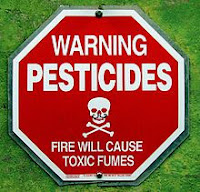Environmentalists are once again taking aim at our nation's food supply in the debate over pesticide use.
And if those groups are victorious, up to 80 percent of Washington's farmland could be affected.
The Center for Biological Diversity sued the Environmental Protection Agency in January, alleging that the EPA failed to demonstrate due diligence in consulting with the Fish and Wildlife Service and the National Marine Fisheries Service about new pesticides.
Farmers are concerned, to say the least. The lawsuit could jettison the use of 380 pesticides used in 49 states, said Rep. Doc Hastings, R-Wash., chairman of the House Natural Resources Committee.
That's a problem. Pesticides are used to, well, control pests of all manner -- bugs, weeds, fungus and more. The use of pesticides increases crop production, decreases back-breaking weed-pulling by workers and creates more appealing produce free of scars left by hungry bugs.
Without pesticides, food would cost more, and there would be less of it. Millions of workers would be needed to pull weeds that threaten to overtake crops. Insects could wipe out entire crops for the season.
No one wants to trade the health of our rivers and lakes for the health of our agricultural industry, but it's possible to marry responsible stewardship with modern farming practices.
Environmental groups seem to leave feeding the world's people out of the equation. Their concern appears solely for the critters.
The lawsuit is seeking protection for 214 endangered or threatened species, from ferrets to salamanders. And, of course, there are the salmon.
If successful, the lawsuit would require farmers to comply with no-spray buffer zones of 1,000 feet around water. "This would have a devastating impact on existing farms and orchards in Washington," said West Mathison, the president of Stemilt Growers in Wenatchee.
Mathison recently went to Washington, D.C., to plead the case of the farmer.
Farmers have found friends in House Republicans, who are trying to relax rules and remove some power from the EPA.
In its lawsuit, the CBD alleges the EPA has been lax in its approval of pesticides. The EPA begs to differ, stating that any new agricultural pesticide has to go through more than 100 tests for potential risks to the environment.
It's not the first time the EPA has been challenged on pesticide use. The agency's pattern in the past has been to settle the lawsuits, creating restrictions for farmers and others who use pesticides. This litigation is similar to past lawsuits, but its much broader scope is causing greater alarm.
A 90-day stay was granted in March, leading some folks to wonder if a settlement is in the works.
In April, several agricultural organizations -- led by the American Farm Bureau Federation -- filed motions to intervene in the lawsuit, saying it seeks "needless restrictions or bans on the use of almost 400 crop protection products." Oregonians for Food and Shelter and the Washington Friends of Farms and Forests also participated in the motion.
It always strikes us with a bit of irony when environmentalists take on farming practices. Farmers are the original stewards of our lands. The last thing they want is to harm the land or the water -- they rely on both for their livelihoods. (source : tri-cityherald.com)
